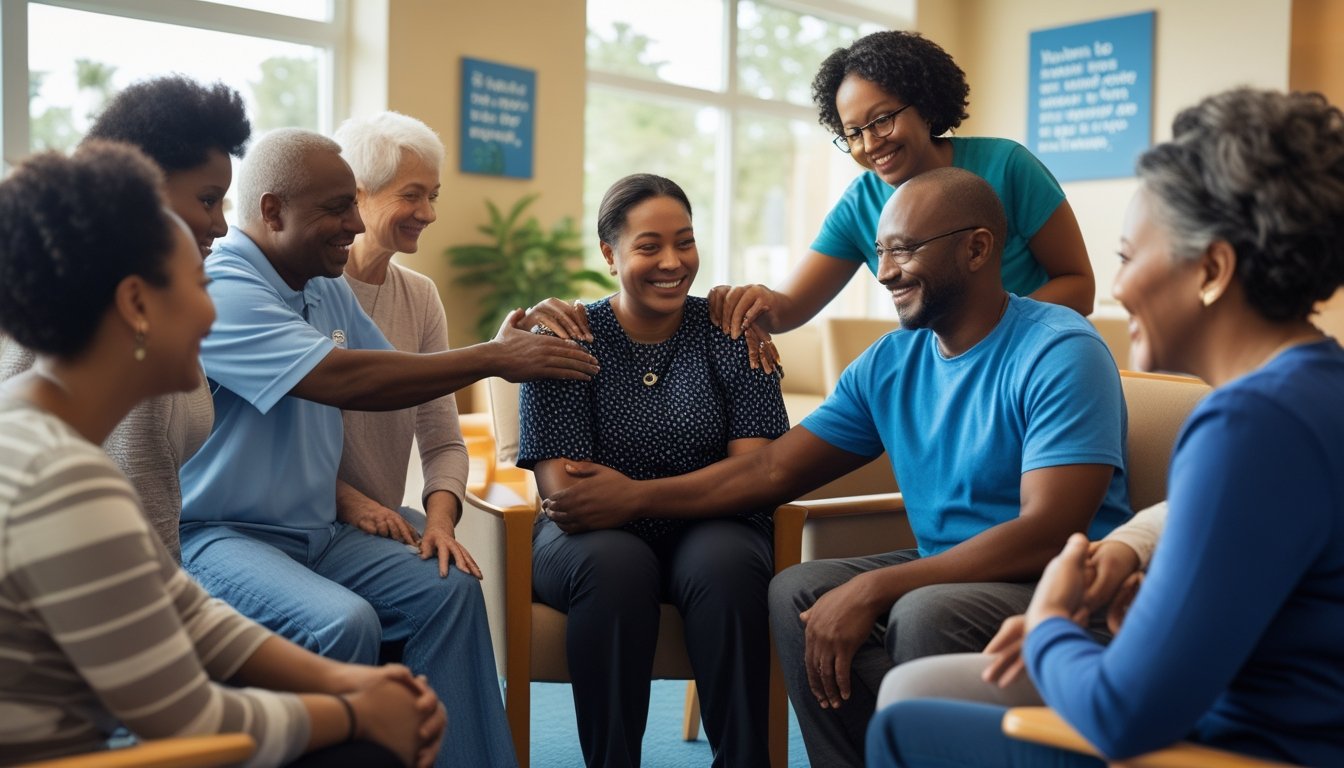Late updated: 15 Jul 2025 11:07
Written by: Ella Thompson
The Influence Of Community Support On Recovery Outcomes: Understanding Key Factors
Community support is an integral component in the path to recovery from substance use disorders. As social beings, our connections with others fundamentally influence our behaviours and outlook. When someone is seeking to overcome addiction, these social ties gain even greater significance. The bonds formed within supportive communities not only offer emotional solace but also provide practical guidance and a sense of accountability that can be pivotal in maintaining sobriety.

In many recovery journeys, the presence of a strong community has been shown to significantly enhance outcomes. Participation in groups, such as Alcoholics Anonymous, often leads to higher abstinence rates and strengthens social networks. The shared experiences within these groups foster an environment where individuals feel understood and supported, making the strenuous journey of recovery more manageable. Quality friendships and peer support contribute to improved self-efficacy, giving individuals the belief and motivation needed to stay on their path.
The essence of community support lies not only in formal groups but also informal systems of care and encouragement. Engaging with various facets of the community, be it through volunteer opportunities, workshops, or sober living arrangements, helps keep individuals grounded. This multi-faceted support system not only aids in reducing relapse rates but also instils crucial life skills and a renewed sense of self-worth.
Key Takeaways
- Community support enhances recovery outcomes.
- Engaging in support groups improves sobriety rates.
- Peer bonds provide emotional and practical assistance.
How Community Support Directly Influences Recovery Outcomes
Community support is a cornerstone in the realm of addiction recovery. It forms a network that feeds emotional strength, fosters resilience, and enhances the quality of life, which in turn promotes long-term commitment to treatment programmes.
Emotional Support and Shared Experiences
Communities offer emotional support that is vital for those recovering from substance use disorders. Being surrounded by individuals who have similar experiences instils a sense of camaraderie and understanding.
This network doesn't just provide sympathy; it offers practical advice and mutual encouragement. Peer groups act as a sounding board where personal stories and triumphs are shared, further motivating members. The camaraderie formed through shared experiences often translates into a strong, supportive foundation that can be relied upon during challenging times.
Impact on Stress, Isolation, and Emotional Resilience
Engaging with a supportive community significantly reduces levels of stress and feelings of isolation, common barriers in the recovery journey. Regular interaction with peers offers a distraction from the pressures of daily life and helps to alleviate feelings of loneliness.
Participating in community activities also builds emotional resilience, making it easier to cope with setbacks. As resilience strengthens, so does the ability to maintain sobriety in the face of adversity. This collective strength empowers individuals to navigate their path to recovery with greater confidence and assurance.
Quality of Life and Treatment Retention
A supportive community positively affects the quality of life and plays a pivotal role in treatment retention. Interaction within these networks often leads to more engagement in social activities and fulfilling relationships, enhancing overall life satisfaction.
Moreover, being part of a recovery-focused community encourages regular attendance in treatment programmes, which is critical for sustaining recovery. The sense of accountability and belonging incentivises commitment to recovery plans, significantly reducing the likelihood of relapse and promoting sustained progress.
Through these means, community support not only influences recovery outcomes but also enriches every facet of the recovery experience, rendering it more meaningful and effective.
Key Types of Community Support in Recovery

Community support is a cornerstone of the recovery process, involving a blend of structured programmes and informal social networks. This aid encompasses peer support groups like 12-Step Programmes, the essential role of family and social connections, and the integration of professional recovery resources and coaches into individuals’ lives.
Peer Support Groups and 12-Step Programmes
Peer support groups, including Alcoholics Anonymous (AA) and Narcotics Anonymous (NA), play a vital role. These 12-Step Programmes provide a structured approach that encourages self-reflection, accountability, and ongoing support. Participants share experiences within these peer networks, fostering a sense of belonging and mutual encouragement. The effectiveness of such groups stems from shared experiences, which is often essential for emotional healing.
Participation in programmes like SMART Recovery and self-help groups offers alternatives to traditional 12-step models, incorporating evidence-based recovery tools and techniques. These recovery programmes focus on empowering individuals with self-reliance through cognitive-behavioural techniques. Engaging with these diverse support networks enhances coping strategies and boosts treatment outcomes.
Role of Family and Social Networks
Family and social networks are pivotal in shaping recovery experiences. Strong family relationships can offer invaluable emotional support, along with practical assistance. By establishing healthy boundaries and open communication, families become positive influences, reinforcing commitment to recovery goals. Social support networks, including friends and community involvement, create a robust layer of support.
Social interactions provide encouragement and accountability, which is indispensable for maintaining progress in recovery. Engaging with accountability partners and community initiatives offers a richer support system, promoting sustained lifestyle changes. Involving family and social connections creates an integrated system that bolsters recovery efforts.
Professional Recovery Resources and Coaches
Professional recovery resources, including recovery coaches and mental health care providers, offer tailored support. They guide individuals through various treatment stages, including Intensive Outpatient Programmes (IOP), by providing expertise and structured guidance. Recovery coaches serve as mentors, offering personalised advice and motivation, enhancing individual commitment to recovery journeys.
These professionals create and facilitate recovery strategies. They address unique challenges like dual recovery, helping individuals manage co-occurring mental health conditions alongside substance use disorders. By integrating professional and community support, we build comprehensive recovery plans that lead to improved long-term outcomes.
Frequently Asked Questions

Community support plays an essential part in enhancing recovery outcomes. By facilitating social connections, fostering accountability, and building emotional resilience, it offers a multifaceted approach to recovery.
What role does social support play in addiction recovery outcomes?
Social support forms the backbone of successful recovery. It helps individuals cope with stress and enhances motivation. The presence of a supportive network often leads to sustained sobriety and improved mental well-being.
How does a support system influence the treatment of addiction?
Support systems provide emotional encouragement and offer practical resources. They help individuals adhere to treatment plans, thereby increasing the likelihood of successful outcomes. Regular interaction with a support system can facilitate quicker adjustments to healthier lifestyles.
Can peer support groups significantly improve treatment outcomes for those with addiction?
Peer support groups create unique environments for sharing experiences and advice. They offer mutual understanding and lessen feelings of isolation, thereby significantly improving treatment outcomes for those battling addiction. These groups act as catalysts for change and resilience.
What is the significance of community involvement in individual recovery processes?
Community involvement helps build a network of accountability and encouragement. Through shared activities and group goals, individuals are held accountable for their recovery actions. This community bond strengthens commitment to personal health and wellness goals.
How does social support in recovery populations contribute to a multilevel understanding of recovery outcomes?
Social support enhances different facets of recovery by addressing both psychological and material needs. From providing emotional support to offering living necessities, social networks facilitate a multilevel approach to understanding and improving recovery outcomes.
In what ways can social support impact substance abuse recovery?
Social support impacts recovery by offering emotional stability, increasing access to resources, and fostering environments that promote healthy lifestyle choices. These factors combined significantly improve the chances of long-term sobriety and reintegration into communities.
